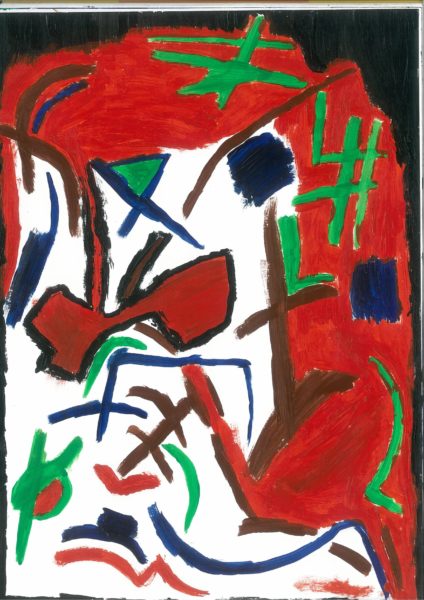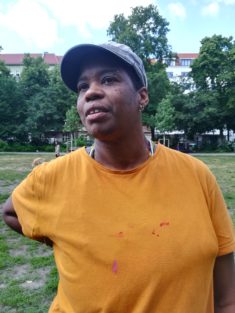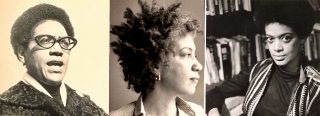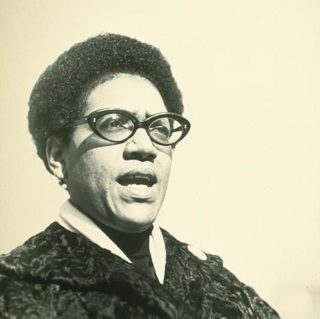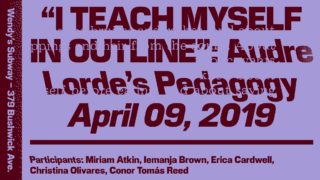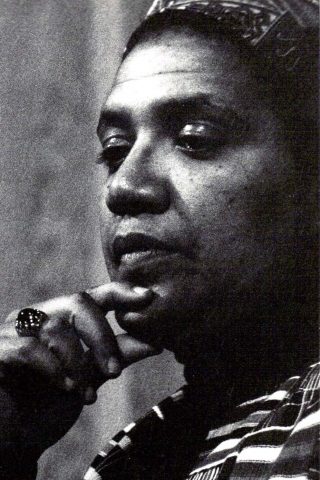[español abajo]
AnouchK Ibacka Valiente
When I arrived in Berlin in 2009, I already knew of Audre Lorde. Nonetheless, I didn’t know her contribution to the building of the Afro-German community.
I had the luck of being introduced to Audre’s work in my twenties in the 90s by a friend from Djibouti. It was beautiful and powerful to self-identify and legitimize myself to a certain degree through her writings. The Parisian lesbian scene was very white, and racism was obviously present. And the realization that the reality was or had been similar in New York decades before helped to dedramatize the situation. And her ideas were a consolation and a kit with which to fight back and validate. I still remember how her polyamorous practices amazed me with her honesty and generosity. In that time it was a great novelty, and if they continue to challenge models of loving, for me, her practices led to other possibilities of imagining affective relationships. From then on, Audre Lorde never stopped accompanying me.
She, who self-identified as a woman who is Black, lesbian, feminist, mother, poetess, and warrior, didn’t choose which aspect she would have to emphasize, and didn’t have the option of cutting herself up in the interest of each one individually.
She assumed that whatever each identification would regenerate, and the politics she defended, were made from the position of her race, gender, and sexual orientation with poetry and accessibility. Her avant-garde and innovative spirit were present in everything she started her whole life. Almost thirty years after her death, her legacy is still alive and valid for new generations everywhere. Together with writing–– which was the other passion of her life––loving, fighting for equality for human beings, and against all types of discrimination were her lifelong priorities. Supporting, empowering, and emancipating Black people in the world against racism, women against sexism, and lesbians against homophobia––that each find the strength to be themselves, without stigma and with self love. One of her mottos was to make and change yourself in spite of fear and to recognize the power that we possess and to use it so that no one can use it against us.
Writing was her key to breaking down dominant logics and proposing other ways of thinking wherein were valued the bravery, the courage of each person, defining priorities, confronting ideas and differences to be stronger together.
The importance of her Afro-Diasporic being is imparted in her work when narrating her priorities and struggles.
She travelled to Germany for the first time in 1984 to teach a class on Black American women poets at the Freie Universität (Free University of Berlin). On that occasion, she taught poetry workshops to Black women and lesbians, realizing the isolation lived by those sisters who didn’t have ways of naming themselves when the only ways of doing so were discriminatory.
Those workshops would mark the beginning of the political work of building the Black movement in Germany. From there began the labor of accompaniment to tell their own stories, recognize themselves, and share their life stories. Lorde shared her experience, her visions, with those women and lesbians to support them in expressing themselves and see what needs they had and how they could fight against the discrimination suffered over the course of a lifetime. While Black people had been in Germany since the seventeenth century, they continued to be invisible and re/negated. Among the participants arose the project of making a book where they’d tell their biographies to make themselves socially visible and break the silence around their identity and presence as Afro-descendant German women.
And so the book was published in 1986, Farbe Bekennen : Afro- deutsche Frauen auf den Spuren ihrer Geschichte.[1]
That year was very important for Black German lesbians, which would also mark the birth of ADEFRA, a group of Black women in Germany which still exists to this day. Not only feminists organized in it.
The creation of the ISD – Initiative Schwarze Deutsch (Black German People’s Initiative, before changing its name to Initiative of Black People in Germany)– headquarters of Black working groups, was a detonator in all German territory where Afro-descendents reclaimed their presence and existence in different ways: radio programmes, magazines, and conferences. The ISD, which for thirty years has organized the Bundestreffen, where Black people of all ages and genders gather, and which is still the main organization of Black people in Germany. They lead different initiatives toward an awareness of Afro-Germans and their diasporas. In February 2016, together with other groups it won from the municipality of Kreuzberg, a Berlin neighborhood, the naming of a street after Audre Lorde. It still has to be decided which street it will be, and it has been delayed by the coronavirus crisis.
In the years I’ve been in Berlin, there is already more than one Black community; it has grown, it has diversified somewhat since not only Afro-Germans are visible, but also other representatives of other African diasporas. The refugee movement that started in Berlin in 2012 brought up other realities and needs. The alliances between community groups aren’t as frequent as they should be, but they are working on it. The differences between us are our strength, as long as it is named and accepted that our realities are diverse and the privileges of each person are distinct.
However, we are already more visible, audible, and organized than we were thirty years ago. And we will be even more and with greater weight in the next twenty. I hope so.
Audre’s work has transformed the lives of many people. In the text “My words will be there” she says: “I write for myself, for my children, and all those people who will read me. But when I say ‘I’ I don’t just mean ‘Audre,’ but also all those brave, incorrigible, and beautiful Black women who always stop and say ‘I am here.’” No one will know if Lorde was aware that her words were fire for the mind and balm for the heart. Hopefully, her spirit will enjoy her efforts to understand how important it is to express herself and trust herself. And they are being absorbed by Black women and everyone else.
May her legacy last for many centuries more.
Audre Lorde y la comunidad Afroalemana
Cuando llegué a Berlín en 2009 ya conocía a Audre Lorde. Sin embargo desconocía su aporte a la edificación de la comunidad afroalemana.
Tuve la suerte de ser introducida a la obra de Audre a mis veinte y picos en los 90 por una amiga de Djibouti. Fue lindo y poderoso identificarse y legitimarse de cierta manera por sus escritos. La escena lesbiana parisina era muy blanca y el racismo obviamente presente. Y realizar que la realidad era o había sido algo similar en Nueva York décadas anteriores ayudaba a des-dramatizar la situación. Y sus ideas eran un consuelo y material para resistir y revindicar. Aún recuerdo como su práctica poly amorosa me había asombrado por su honestidad y generosidad. En esa época era una gran novedad y si en la actualidad sigue desafiando los modelos amorosos, para mi marcaron otras posibilidades de imaginarse las relaciones afectivas. Desde entonces la Audre nunca dejaría de acompañarme.
Quién se definía mujer afro, lesbiana, feminista, madre, poetiza y luchadora no elegía que parte de ella tendría que relucir y no daba la opción que la descuartizaran según los intereses de cada cual.
Asumía lo que eso regeneraba y las políticas que defendía las hacía desde su postura racial, de género y de orientación sexual con poesía y accesibilidad. Su espíritu vanguardista e innovador estuvieron presentes en todo lo que inició a lo largo de su vida. Casi treinta años después de su caída, su legado sigue vivo y válido para las nuevas generaciones por doquier. Conjuntamente con la escritura que era la otra pasión de su existencia con amar, luchar por la igualdad de los seres humanos y en contra de las discriminaciones de todo tipo era su prioridad. Apoyar, empoderar y emancipar a las personas afro en el mundo en contra del racismo, a las mujeres en contra del sexismo, a las lesbianas en contra de la homofobia: que cada cual encontrase la fuerza de ser sí, sin estigma y con amor propio. Unos de sus lemas era hacer y realizarse a pesar del miedo y reconocer el poder que poseemos y usarlo para que nadie lo disponga en nuestra contra.
La escritura era su clave para desmenuzar las lógicas dominantes y proponer otros pensamientos donde se valoraba la valentía, el coraje de cada cual, definiendo las prioridades, enfrentando ideas y las diferencias para ser más fuertes juntxs.
La importancia de su ser afrodiaspórico se transmite en su obra a la hora de narrar sus prioridades y luchas.
Viajó a Alemania por primera vez en el 1984 para impartir un curso sobre poetisas afroestadounidenses en la Freie Universität (Universidad Libre de Berlín). En esa ocasión impartió talleres de poesía a mujeres y lesbianas afro, se percató del aislamiento vivido por esas hermanas que no tenían manera de nombrarse ya que las únicas formas existentes eran discriminatorias.
Esos talleres marcarían el inicio del trabajo político a la construcción del movimiento afro en Alemania. Y de ahí empezó la labor de acompañamiento a narrarse, reconocerse y compartir sus historias de vida. Lorde compartió su experiencia, sus visiones con esas mujeres y lesbianas para apoyarlas a que se expresasen y vieran qué necesidades tenían y de qué manera podrían combatir las discriminaciones sufridas a lo largo de toda una vida. A pesar de que las personas afro están presentes en Alemania desde el siglo 17 seguían invisibles y re/negadas. Entre las participantes surgió el proyecto de hacer un libro donde contarían sus biografías para visibilizarse socialmente y romper el silencio alrededor de su identidad y presencia como alemanas afrodescendientes.
Así vio la luz el libro en 1986, « Farbe Bekennen : Afro- deutsche Frauen auf den Spuren ihrer Geschichte».[1]
Ese año fue muy importante para las lesbianas afro alemanas ya que marcaría también el nacimiento de ADEFRA , un grupo de mujeres negras en Alemania que aún existe en la actualidad. No solo las feministas se habían organizado.
La creación del ISD -Initiative Schwarze Deutsch- (iniciativa de personas negras alemanas antes de cambiarse a personas negras en Alemania) sede de grupos de encuentros afro, fue un detonador en todo el territorio alemán donde lxs afrodescendientes revindicaron su presencia y existencia de diferentes formas: programas de radio, revistas y conferencias. El ISD, que desde hace más de treinta años organiza el Bundestreffen donde se reúnen durante tres días personas afro de todas las edades y géneros, es todavía la organización principal de las personas afro en Alemania. Lideran diferentes iniciativas para una mayor sensibilización de lxs afro alemanxs y las diásporas. Conjuntamente con otros grupos se logró en febrero 2019 que la municipalidad de Kreuzberg un barrio de Berlín acceda al pedido que una calle lleve el nombre de Audre Lorde en el barrio del mismo nombre. Falta decidir cual calle será y sólo se ha aplazado por la crisis del corona.
En los años que llevo en Berlín, ya hay más que una comunidad afro; ha crecido, se ha diversificado algo ya que no solo son visible lxs afro alemanxs sino también otras representantes de otras diásporas africanas. El movimiento de refugiadxs que se inició en Berlín en 2012 dio a relucir otras realidades y necesidades. Las alianzas entre los grupos de las comunidades no son tan frecuentes como deberían pero ahí se va trabajando en base a eso. Las diferencias entre nos son nuestra fuerza mientras se nombren y se acepte de que las realidades son diversas y los privilegios de cada cual distintos.
Sin embargo ya somos más visibles, audibles y organizadxs que hace treinta años. Y aún seremos más y con mayor peso en los próximos 20. Eso espero.
La labor de Audre ha transformado la existencia de muchísimas personas. El texto «mis
palabras estarán», dice «yo escribo para mi misma, para mis hijxs y todas aquellas personas que me leerán. Pero cuando digo yo no significa sólo Audre sino todas esas mujeres negras, valientes, incorregibles y hermosas que constantemente se paran y dicen Yo estoy aquí.» No sabremos si Lorde tenía consciencia de que sus palabras son fuego para la mente y bálsamo para el corazón. Ojalá su Espíritu disfrute de sus esfuerzos para dar a entender lo importante que es expresarse y confiar en sí. Y estén siendo asimilados por las mujeres afro y todxs lxs demás.
Pueda su legacia durar muchos siglos más.
This essay was translated into English by Julián González Beltrez.
